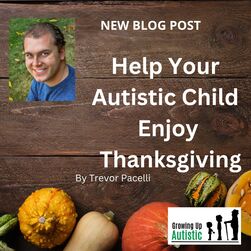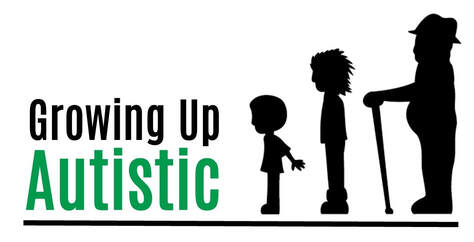 By Trevor Pacelli Thanksgiving, like most holidays, is prone to overwhelm kids on the autism spectrum. It’s a day of having lots of guests in the house or going to see guests whose rules are different from back home. The kids are also expected to be present and active the whole time around family friends and relatives. Along with the constant socialization and change in routine, there are also lots of new, unfamiliar foods. To help your autistic child enjoy Thanksgiving despite the overwhelming amount of newness, here are some ideas to help: Schedule- Growing up, I always woke up at the same time, ate at the same times, and went to bed at the same time. I found comfort in routine and predictability. That’s why I needed to know what was going to happen, and when, to enjoy holiday celebrations. Even if I had to stay awake later and eat dinner later, being given an expectation of the day’s events and times helped me enjoy the day. You can do the same with your autistic child by giving them a schedule ahead of time of what Thanksgiving will look like. For example, 2:30 is when guests are going to arrive, 4:00 is dinner, 6:00 is dessert, 7:00 is the family game, and 9:30 is when the guests leave. Socializing- With my Thanksgivings, the kids often went and did their own thing separate from the grownups. I usually had minimal problems with this scenario since I often already knew the other kids fairly well. However, this wasn’t the case when we visited my dad’s relatives in Arizona, with many cousins I couldn’t name until I was in college. The problem was that I never got a proper introduction to who everyone was or how I was related to them. Thus, my time spent with them, not just for Thanksgiving but any celebratory occasion, was uncomfortable for me. So, it’s helpful to give your autistic child proper introductions to the kids of the host family so they’ll feel more comfortable and prepared. Food- Across my childhood, I rarely ate anything besides grilled cheese, French fries, macaroni and cheese, and most sweets. No matter how much my parents tried to encourage me to try new foods, I just hated the thought of eating anything new—even cheeseburgers were unappetizing until I was nine. Many autistic kids are hypersensitive to specific tastes, smells, and textures, which can make them even pickier eaters than other kids their age. To help your autistic child eat the given meal on Thanksgiving, give them the chance to taste something like turkey and other dishes a few days before. If they end up liking the food, great! You broke new ground! If not, don’t press on them to eat the unfamiliar foods on Thanksgiving. Let them eat the foods offered that they do enjoy eating and don’t worry if it’s just dinner rolls and cranberries. Bedtime- First of all, it’s a good thing when your autistic child wants to keep their routine of going to sleep the same time each night, for sleep experts agree that a consistent sleep cycle is crucial. So don’t think that your child is being whiny for wanting to go to bed at 9:00 like always when the party’s expected to keep going for another hour and a half. If you’re the one hosting, simply give your child permission to put themselves to bed at their scheduled time, or step away and help them. But if you’re at someone else’s house, knowing the schedule mentioned earlier comes in handy. Yet if they’re really exhausted and can’t carry on any longer, simply allow them some alone time. Just like how introverts need time to themselves to recharge, anyone with autism would need the same to not get overwhelmed. Thankfulness- It’s often tradition for people around the Thanksgiving table to share what they’re thankful for. The most common answers are usually, “I’m thankful for my parents” or “I’m thankful for our health and safety.” Yet don’t be surprised when it’s the autistic kid’s turn to share what they’re thankful for, and they say, “I’m thankful for SpongeBob SquarePants!” Most people with autism have a rather low priority for human relationships, especially since they don’t have the tendency to relate to other humans very easily. They find great comfort around fictional characters. If a child wants to say they’re thankful for Spider-Man or Bluey, don’t reprimand them or feel offended. It doesn’t mean they’re not grateful for you or their siblings. But more importantly, don’t force them to say they’re thankful for a person, because if pressured into saying this, they won’t mean it. Ultimately, the main takeaway is that no matter what your circumstances are like with your autistic child, don’t focus on trying to cover up the inconveniences. Instead, help your child draw attention to whatever excites them. Maybe they would be excited for the yummy cookies? Or maybe the games? Or maybe the movie you’ll all watch together? Focusing instead on what is fun for your child rather than a hindrance will give everyone in your family a chance to enjoy time as a community, forming fond memories that’ll last for years to come. Trevor Pacelli is a young adult author on the autism spectrum. He is the author of Six-Word Lessons on Growing Up Autistic, What Movies Can Teach Us About Disabilities, and other books.
0 Comments
|
Inspiration for Life with AutismThis blog has a variety of articles about people living life with autism, and topics and ideas that can help in the journey. Guest bloggers are welcome. Inspired by Trevor, a young adult film critic, photographer and college graduate on the autism spectrum. Categories
All
Archives
July 2024
|
Proudly powered by Weebly

 RSS Feed
RSS Feed